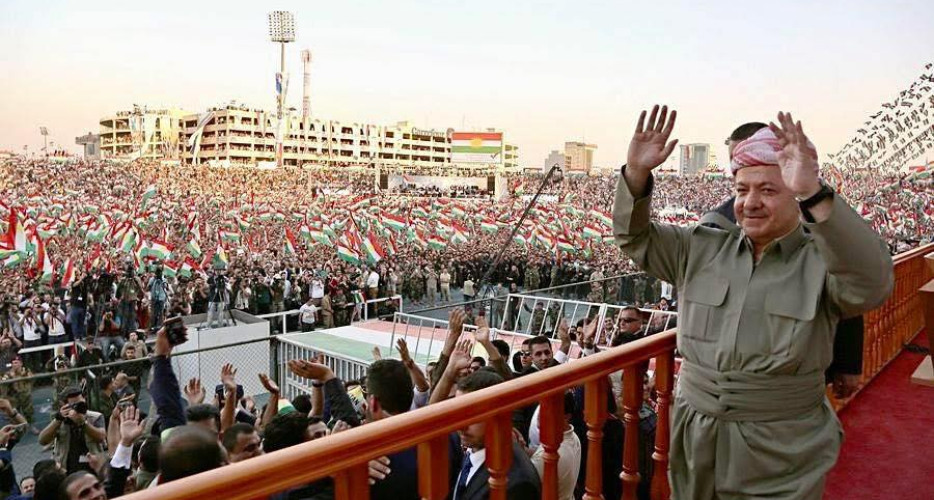Kurdistan Marks Eighth Anniversary of Referendum, Barzani Says: 'What is Sown Today Will Be Reaped Tomorrow'

Peregraf
Today marks the eighth anniversary of the historic September 25, 2017 independence referendum in the Kurdistan Region, a day that continues to evoke pride, controversy, and political division among Kurds and their leadership.
In a statement commemorating the anniversary, Masoud Barzani, President of the Kurdistan Democratic Party (KDP) and the architect of the referendum, delivered an emotional message: "A homeland is not a map on paper; rather, it is blood that circulates in the veins. What is sown today will be reaped tomorrow." His words underscored his longstanding view that the referendum, despite its turbulent aftermath, remains a milestone in Kurdish history.
Kurdistan Region Prime Minister Masrour Barzani also issued a message, calling the day "a day of hope and optimism." He congratulated the people of Kurdistan, the families of martyrs, and the Peshmerga forces, describing the referendum as "the day of the courageous decision of the people of Kurdistan, the day of the victory of our nation’s will."
A Divisive Legacy
The referendum, championed primarily by the KDP, remains one of the most polarizing events in modern Kurdish politics. Proponents continue to frame it as a historic exercise of self-determination, while critics blame it for triggering political and territorial setbacks.
On September 25, 2017, millions of Kurds across the Kurdistan Region and Kurdish-inhabited areas beyond its formal boundaries went to the polls to answer a simple but momentous question: Should the Kurdistan Region and the Kurdish areas outside the region become an independent state?
More than 92 percent of voters responded with "yes," a result that resounded globally and sent waves of both celebration and alarm across Iraq and the wider region. Yet, the victory was short-lived.
Fallout and Retaliation
The Iraqi federal government swiftly rejected the referendum as unconstitutional. Within weeks, Baghdad imposed punitive measures, including the closure of airports in Erbil and Sulaimaniyah and the suspension of diplomatic engagement with Kurdish authorities. On October 16, 2017, Iraqi forces, backed by Popular Mobilization Units, advanced into disputed territories, most notably Kirkuk. Kurdish Peshmerga forces withdrew under contentious circumstances, leading to accusations of betrayal within Kurdish ranks.
The loss of Kirkuk and other disputed territories was a devastating blow, both symbolically and strategically, as many Kurds considered Kirkuk the "heart" of their homeland. The crisis displaced thousands and resulted in heavy Peshmerga casualties.
Internal Divisions
The referendum not only strained relations between Erbil and Baghdad but also deepened fissures among Kurdish parties. The KDP and parts of the Patriotic Union of Kurdistan (PUK), particularly a faction led by Kosrat Rasul Ali, remain firm in defending the referendum as a legitimate right of the Kurdish people.
However, other factions within the PUK are accused by KDP officials of having "betrayed" the Kurdish cause by cooperating with Iranian-backed forces during the retaking of Kirkuk. These divisions echo a long history of mutual recriminations among Kurdish parties, who have often accused one another of treachery during critical moments over the last half-century.
Other parties, including Gorran, adopted ambiguous positions. While its General Coordinator later admitted to voting in favor, the party did not actively campaign for the referendum. Meanwhile, the "No Now Movement," led by businessman Shaswar Abdulwahid, opposed the vote outright, arguing that it was reckless and ill-timed. Its supporters, branded as traitors at the time, now argue that their warnings about the negative consequences proved accurate.
Regional and International Pressure
The referendum also sparked widespread regional and international condemnation. Both Turkey and Iran, wary of emboldening their own Kurdish populations, strongly opposed the vote. While Turkey refrained from military retaliation, Iran exerted considerable pressure and played an active role through its Revolutionary Guard commander, Qasem Soleimani. He maintained close ties with segments of the PUK and is widely believed to have orchestrated the events that led to the Iraqi takeover of Kirkuk.
The United States, Britain, France, and the United Nations also pressed Kurdish leaders to postpone or cancel the referendum, offering alternative frameworks for negotiations with Baghdad. Masoud Barzani, however, rejected these proposals, arguing that no concrete guarantees were given.
Legal and Political Stalemate
In the years since, Iraq’s Federal Court has declared the referendum unconstitutional, a ruling officially acknowledged by the Kurdistan Regional Government. Yet, the Kurdistan Parliament and former President Barzani maintain that the will of the people expressed in 2017 cannot be annulled by any court or institution.
This legal ambiguity reflects the broader political stalemate. While the referendum remains a source of pride for many Kurds, it also symbolizes missed opportunities, deepened divisions, and a painful chapter in relations with Baghdad.
Eight Years On
Eight years later, the referendum continues to shape Kurdish politics and public discourse. For supporters, it is a reminder of the Kurdish people’s right to self-determination and a foundation for future aspirations. For critics, it stands as a cautionary tale of miscalculation and the heavy costs of unilateral political decisions.
As the Kurdistan Region marks the anniversary, the words of its leaders capture both the resilience and the unresolved tensions of that momentous day. Whether the referendum will ultimately be remembered as the dawn of a future Kurdish state or as a lost opportunity remains a question that continues to divide Kurdistan’s leaders and its people.